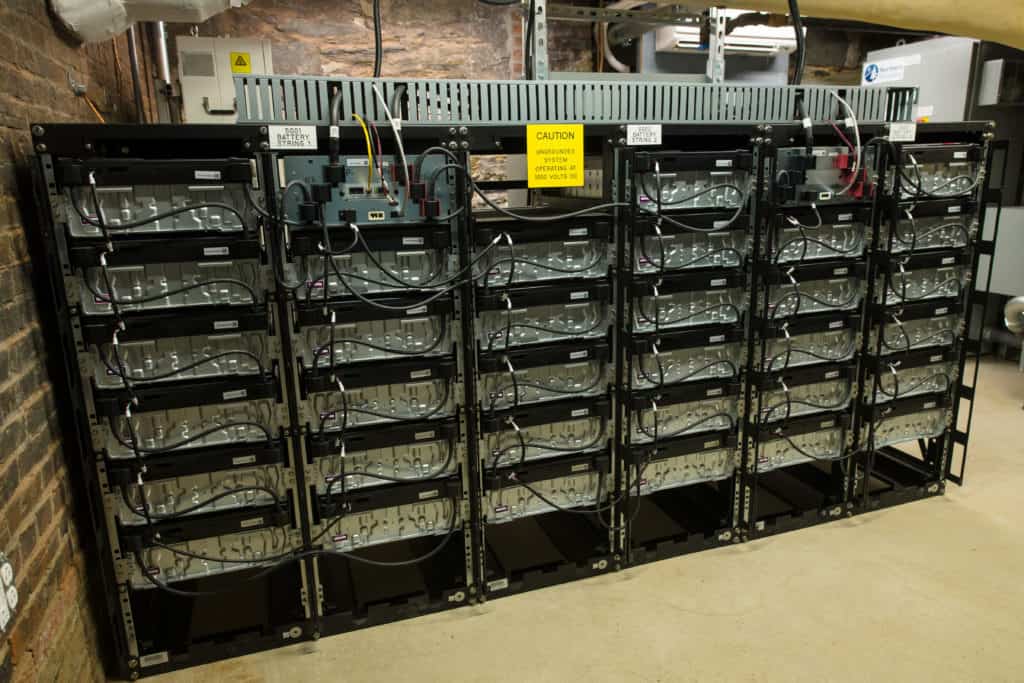
Vermont businesses team with state to save Vermonters money and cut carbon
Vermont’s Statehouse is first in the nation to have clean backup power stored in batteries —using a GMP program to help lower costs for all Vermonters. State officials, and leaders from Northern Reliability, Dynapower, Virtual Peaker and Green Mountain Power (GMP) were joined by state officials and legislative leaders to make the announcement Jan. 5 during a virtual news conference.
Governor Phil Scott praised the project in a video comment shared at the event. “With ‘out of the box’ thinking, common sense and collaboration, we can address tough issues like climate change and do our part to reduce carbon emissions without hurting the economy. I know many think clean energy must be more expensive, but the work done today shows not only can we reduce carbon emissions, but if we are strategic, we can also save money in the process,” Gov. Scott said.
The Statehouse battery project is expected to save Vermont taxpayers $44,000 and GMP customers an additional $18,000 over 10 years while also supplying clean backup power. The batteries are projected to reduce carbon emissions by 6,388 pounds per year, the equivalent of not using 326 gallons of gasoline.
“BGS is excited to be a part of this ambitious effort,” said Acting Commissioner Jennifer M.V. Fitch, P.E. “We hope that this project will become a model for energy management strategies and backup power systems in public buildings, and for the public-private partnerships that make them work.”
The batteries are part of GMP’s first-in-the-nation Bring Your Own Device (BYOD) for Business program – which provides financial incentives to businesses that install batteries and share some of that back up energy. GMP uses that stored power during energy peaks, when power is costliest and dirtiest.
“It is great to see the results of this collaboration to reduce carbon emissions. Vermont is leading the way and this project shows how we can all make a difference,” said Rep. Alice Emmons, D-Springfield, whose committee helped facilitate the project.
The Samsung Mega E2 batteries were installed in the basement of the State House where a failing fossil fueled generator from the 1960s once was. The 250 kWh of battery power came online this fall, and now backs up more critical systems for the historic building, including the elevator.
Northern Reliability procured and built the battery system for the state. “It’s incredibly impressive that leadership in our state government is forward-thinking enough to replace their fossil fuel redundancy with an Energy Storage System. Its ability to fulfill their backup needs and be used by GMP for peak avoidance is just one of many ways that Governor Scott and our state leaders are doing their part not only to reduce our carbon footprint but also to work with our utilities to reduce the cost of power,” said Jay Bellows, CEO of Northern Reliability.
Adam Knudsen, CEO of Dynapower in South Burlington, which supplied the inverter for the project, said: “This is a perfect example of world class Vermont organizations coming together to help tackle climate issues here at home and lead the nation. Energy storage presents an incredible opportunity for Vermont to leverage its in state technical talent to reduce our greenhouse gas emissions and grow jobs here in Vermont — a win-win for the state.”
Energy storage is an important way to provide resiliency, manage the grid cost effectively, and the flexibility of batteries means the potential for even more benefits for customers in the future.
“At GMP we are about working together to deliver solutions and this project is a great example of what can be done. It will save all Vermonters, including GMP customers money while adding to GMP’s network of stored energy. That network reduced more than $3 million in costs for customers last year. We can do this with more Vermont businesses to help them save,” said Mari McClure, GMP’s president and CEO.
Batteries work like generators – without the fossil fuels. They switch on seamlessly if there is an outage.
State Curator David Schultz noted that the energy profile of the State House has been in a constant state of evolution, “The building itself dates to the mid-19th century, when its chandeliers were illuminated with coal-fired gas. Electricity was finally installed in 1898, and now, over 120 years later, there is an unprecedented reliance on power and technology to do the people’s business.”




